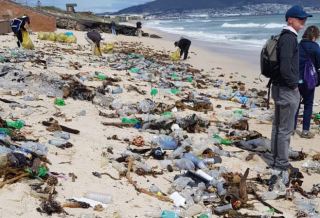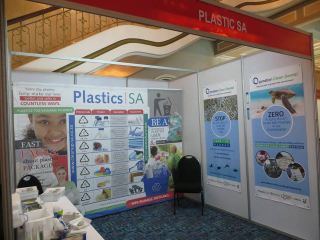Initiative to Capture Cape Town’s Trash Before it Hits the Coast
The City of Cape Town has joined key players and interested groups in the first of many meetings, to investigate ways to remove garbage from Cape Town’s rivers so it doesn’t make it into the ocean.
Included at the meeting were Plastics|SA, the South African Department of Environmental Affairs, Woolworths, The Percy Fitzpatrick Institute of African Ornithology, The Polyolefin Recycling Company (Polyco), Cape Town non-profit organisation Clean C, local digital marketing firm Gnu World Media and several other groups.
John Kieser, Sustainability Manager of Plastics|SA and facilitator at the meeting, says the main goal of this network will be to share information, ideas and resources for minimising the amount of litter that washes into the city’s seas.
Black River in Observatory is the first focus area. Already, Plastics|SA and the City of Cape Town’s Environmental Management Department have set up a system to remove litter floating on the river – 80 to 90% of which is plastic. A team gathers plastic at designated areas once or twice a week and takes it to Bokmakierie Primary School, where it’s separated and sent off for recycling.
In KwaZulu-Natal, the Department of Environmental Affairs is currently conducting similar projects, focusing on the Umgeni and three other rivers. If all goes to plan, the Department may consider funding similar Expanded Public Works Programme (EPWP) projects in Cape Town.
In the meantime, Kieser says the Cape Town network of groups will prevent people with the same vision – keeping our rivers and thus our oceans clean – from working in silos.
“It’s great that the plastics industry is facilitating this kind of dialogue,” says Gregory Player of NPO Clean C. With support from Cape Town-based digital marketing firm Gnu World, Clean C is working on a similar project – installing litter-catching nets over stormwater drains in the 4 kilometres between Sunset Beach and Milnerton Lagoon. Large amounts of household and general refuse – mostly plastic – washes into the lagoon from drains in areas including Joe Slovo, Sanddrift and Milnerton and then ends up on the beach and in the ocean.
The project would require a trained team of five to do regular clean-ups, and equipment like wheelie bins, uniforms, and a truck to transport the collected garbage.
Player says many EPWP projects run only in the short term and that most of the achieved improvements are lost once funding ends. “We’d like sponsorships to get the project off the ground – but once it’s implemented, we will move towards making it self-sustaining,” says Player.
Taryn Nightingale, PR and outreach specialist at Gnu World Media, says, “People forget that we form part of the same ecosystem the rivers, plants, oceans and animals do. We need to change how we view plastic and its value. When it’s recycled, there’s the opportunity to earn money from it, but when thrown away, it has grim consequences.
”Currently, only 5% of South Africans recycle. Mandy Naudé, CEO of Polyco, says the main reasons for this are a lack of education, incentive and infrastructure. “We must make it convenient for South Africans to recycle.” The organisation recently launched PACKA-CHING, which aims to increase recycling in informal settlements and lower-income areas. It has been running in Langa for about a year, and has resulted in the removal of about 240 000 kilograms of plastic since its inception.
Anyone interested in joining this network of plastic catchers or in helping in some way can contact John Kieser at This email address is being protected from spambots. You need JavaScript enabled to view it..
African Marine Waste Conference Highlights need for more Collaboration, Communication and a Clear Game Plan for the Plastics Industry
The 2017 African Marine Waste Conference took place from the 9th to the 13th of July in Port Elizabeth, and was attended by approximately 200 delegates from 9 African states and a further 10 countries from other continents.
The inaugural African Marine Waste Conference was managed by the Sustainable Seas Trust (SST) under the leadership of Dr Tony Ribbink, CEO of SST, and aimed to continue the concerted effort of better managing marine litter with the help of governments, NGOs, researchers and other stakeholders across the African continent.
Plastics|SA hosted the first two African Marine Debris Summits that took place in Cape Town in 2014 and 2016 with the support of UNEP (United Nations Environmental Programme), the Department of Environmental Affairs and SANBI (SA National Biodiversity Institute), and also participated in the launch of the African Marine Waste Network that took place in Port Elizabeth in July last year.
“This year’s conference built on the initiative started three years ago to create a platform for African and international delegates and experts to discuss issues relating to marine waste around the African continent, including data and research, capacity building, prosperity through the development of economic enterprises centred on waste management, education and awareness and the role of the consumer, government, industry and municipalities. The focus at this year’s event was on finding innovative solutions that would cater to African circumstances and cultures and using opportunities to shape a brighter future for the human health, economies and environments of Africa,” explained Douw Steyn, Sustainability Director at Plastics|SA.
“By bringing together delegates primarily from Africa, along with advisors from other continents, a variety of different sectors and insights were represented. We participated in various fruitful discussions and debates on issues relating to marine waste in Africa, enabling us to develop a strategic plan entitled “Marine Waste Strategy: Guide to Action for Africa”, for tackling and alleviating the continent’s waste problems,” Steyn disclosed
In addition to presentations, panel discussions and parallel sessions, workshops on microplastics, data and research, and mobile applications were also held over the duration of the conference. Plastics|SA chaired an industry workshop featuring participants from various sectors. Industry representatives, scientists, educators, waste disposal experts and the maritime sector were encouraged to engaged in a debate which aimed to identify the issues that have the biggest impact on the marine environment.
The following points were highlighted during the plastics industry panel discussion
- It is vital that industry has awareness of marine waste issues
- Communication between industry members needs to be improved in order to integrate fragmented initiatives, avoid duplication and promote best environmental practices. Focus should not be exclusively on packaging companies but should expand to include the maritime industry.
- Industry should take responsibility of marine waste issues by encouraged to be compliant and accountable
- Alliances and partnerships between sectors are also lacking and current public partnerships are too few and ineffectual. Industry needs to collaborate more openly and sincerely.
- Knowledge gaps in technology and data should be addressed.
- Recycling levels in South Africa and the perceived value of waste should be improved.
- Clear master plans need to be developed with tangible outcomes within specific timeframes and with impactful marketing plans to increase participation and buy-in by the general public.
“The plastics industry has long been involved in efforts to reduce plastic marine litter, from conducting research to enhancing product stewardship to cleaning up beaches. As the umbrella body representing the entire South African Plastics industry and a signatory of the Declaration of the Global Plastics Associations for Solutions on Marine Litter, Plastics|SA will continue to support and collaborate with industry efforts aimed at combatting marine litter.
We recognise that there is still a lot of work that needs to be done, but look back at very big inroads that we have already managed to make to address the problem head-on and offer real solutions. If we continue to take the right steps, we believe that waste can indeed become profitable to countries of Africa. The environment, human health and tourism are but a few areas that stand to benefit significantly if we are to devise a workable strategy for managing waste in and around our continent,” Steyn concluded.
The next African Marine Waste Conference set to take place in 2019. For more information or a detailed report about this year’s conference, visit https://africanwastenetwork.org.za or www.plasticsinfo.co.za.



